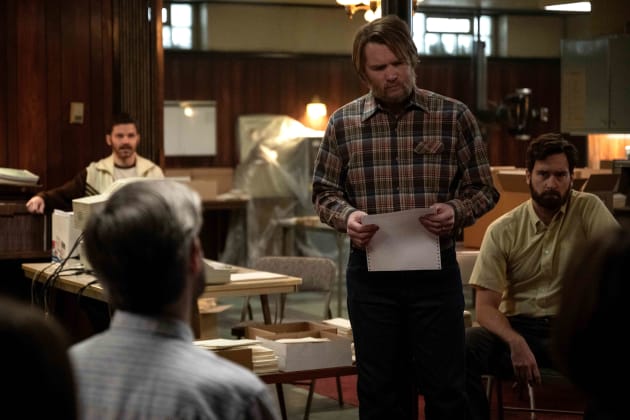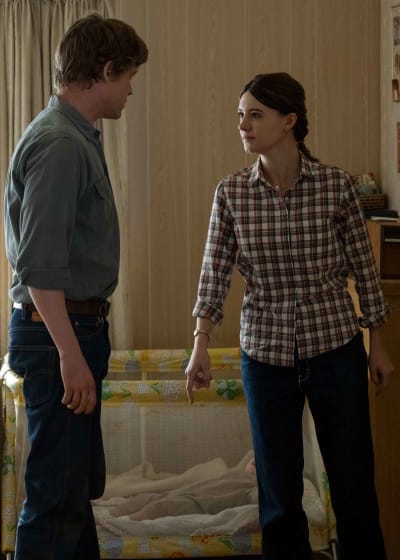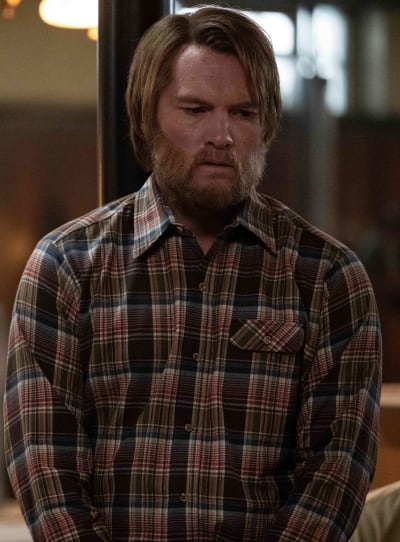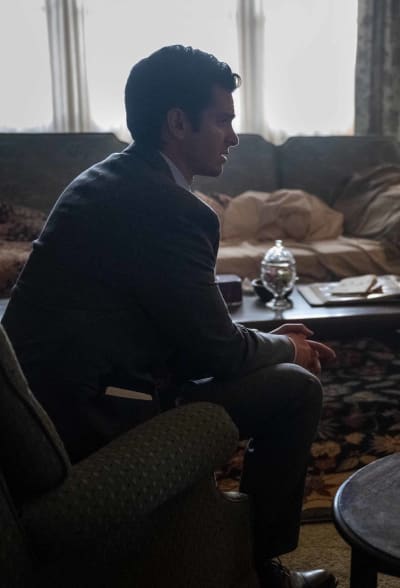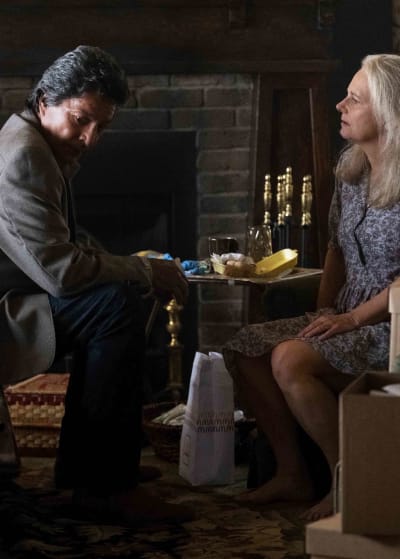The end is nigh.
The characters central to the investigation get some much-needed backstory on Under the Banner of Heaven Season 1 Episode 6.
Not only did we get insight into Ron’s journey and learn more about the School of Prophets, but Brenda’s motivations were finally brought to light — and incriminated the church’s leaders.
Brenda has been a bit player in her own story, but thanks to a pile of letters from her sister that give insight into her heart, mind, and soul, we can understand her better.
Even more men are complicit in her death — the church leaders who refused to listen to her cries for help and even egged her on by giving her a “sacred mission.”
Brenda’s point of view has been sorely needed in this story, and at last, Daisy Edgar-Jones gets to shine.
Brenda recognizes how the church has limited her, but despite her trying to break free, all the outside forces pull her back in, spelling her doom.
Brenda must have genuinely believed she could make things right and have a good life with Allen and their baby, but Betty should have encouraged her to go to Missoula, where she would be safe.
It shows the insidious nature of the church’s value system. Unless it’s flat-out, consistent, life-threatening violence, domestic abuse survivors are encouraged to “work it out” with their abusers, even by other women.
Look at the amazing thing Heavenly Father did for us — provided a religion to weather the changing world.
Bishop Wright
Brenda’s scenes with Betty and Dianna were heartfelt. They knew what was happening to the wives of their brothers-in-law wasn’t right, but even Brenda couldn’t imagine the horrors that these men were capable of and what lengths the church would go to gaslight her and keep things looking clean.
Dianna’s safety is still in question, and no doubt we will find out her fate in the final episode.
Thankfully Dianna and the kids got out, but if something happened to them — if Ron got to them somehow — perhaps Onias knows something about that and will inform Taba now that they have met.
The Matilda part was confusing, primarily because of where it figures in the timeline. Was this before or after she and Dan had gone to live on the farm? We still don’t know how things played out between Matilda and Dan.
This means we, as viewers, have to fill in the gaps in Matilda’s story.
What happened with Cora and Eilidh after they ran away from their foster home? Did Dan ask Matilda where they had gone? And if so, did he punish her? Or did Brenda’s warning from Matilda come earlier than that scene from Under The Banner Of Heaven Season 1 Episode 5?
The rigid adherence to the epistolary form is this show’s weakness.
It felt creative at first, but so much of it is told in flashbacks that it keeps the show from having any sense of urgency and limits the information we get as viewers. But then it takes us to places that none of the other characters ould know about — for instance, Ron’s journey.
There were many “revelations” in the episode, including one that suggests Ron may have been secretly gay or bisexual. Could closeted homosexual feelings be responsible for Ron’s inner turmoil and rage?
God takes what you love so you cannot turn back.
Prophet Onias
The closeted religious man is a tired trope, though it’s unclear how common it is in real life. And is it just the viewer seeing this, or is Brady recounting this to Jeb? If so, how did he know that aspect of it? The narrative conceit is inconsistent and distracting.
Is that what the long, lingering shot of the closet was about, a thinly-veiled metaphor? Or is someone or something hiding in there? Is there some crucial piece of evidence in that closet?
Ron and Dan are shaping up to be our big villains, but they are still sketchily drawn. What information will be imparted in the finale to explain how they concluded that their sister-in-law deserved blood atonement?
Brady: Brother, when men of faith say that they feel the burning of the bosom by the Holy Spirit, I was raised to believe it.
Detective Jeb Pyre: If they told me their bosom was burning to let someone die, I’d do my own praying.
The issue with a collective group of villains — we’re looking at Dan, Ron, Chip, and Ricky (who hadn’t been mentioned until this episode) as well as the other Laffertys, Onias, and the School Of Prophets — it dilutes the threat.
But maybe that’s what “true” crime is. It’s messy, sprawling, and hardly ever just one person, especially when people are working under the assumption that God is leading their hands.
Jeb is a great hero, but it’s still hard to understand how this became his story.
It’s hard to complain about Andrew Garfield, though. His moments with his mother are so tender, as well as his sensitivity with his wife. He knows he has to be strong, but he’s not afraid to share his feelings with her.
Jeb will likely be “forced” to choose between declaring his devotion to the congregation and pursuing the investigation. Considering where his head is at, the outcome appears inevitable. Whatever is in Allen’s book has shaken him to his core.
I read our history. All of it. All of that personal revelation — it seems to me that it’s just men listening to their own selfish desires, and calling it God, so they can justify anything.
Allen Lafferty
The honesty between Jeb and Rebecca is lovely, and Adelaide Clemens matches Garfield’s level with gentle sincerity, but her motivations lack nuance.
As a Mormon woman, shouldn’t she care about bringing the killer of a Mormon woman to justice? Or is she that worried about ex-communication?
It would be helpful to see her motivations rather than reducing her to an obstacle, albeit a loving one, for Jeb.
If Jeb chooses to continue with the case, he “forsakes” his church. His wife might not like it, but since her faith dictates that she must “work on her marriage” above all else, it doesn’t feel like much is at stake.
Jeb is a good husband, son, and father. The idea that Rebecca would leave him is ludicrous, given what we’ve seen of how hard it is for a Mormon woman to leave her husband at the worst of times.
I’m only beholden to your sister. I won’t be deterred, not by anybody. I swear to you.
Detective Jeb Pyre
Overall, this episode was stronger than its predecessors. It felt more focused. The core characters all had their moments — Brenda, Ron, Jeb, and Allen.
It’s worth noting that since Joseph Smith “died off” on the previous episode and mentions of Brigham Young were kept to a minimum, the story felt much tighter.
It’s not that the old-time Mormon history isn’t well done (and has given us a strong female character in Emma Smith), but the lack of it isn’t a detriment.
There’s only one episode left, and it’s hard to know where this road will take us. Here’s hoping for a confrontation between Jeb, Ron, and Dan — it should be exciting, as it would take place in the present timeline and thus should feel more urgent.
How do you think it will all end? Share your thoughts in the comments.
Mary Littlejohn is a staff writer for TV Fanatic. Follow her on Twitter.
